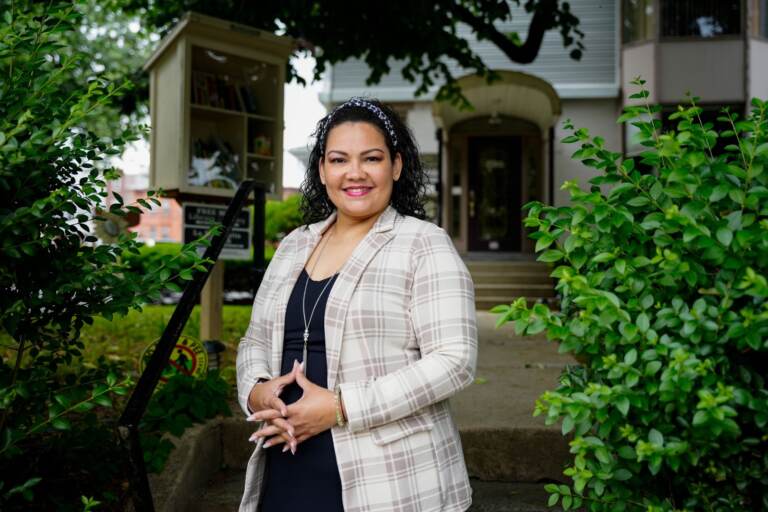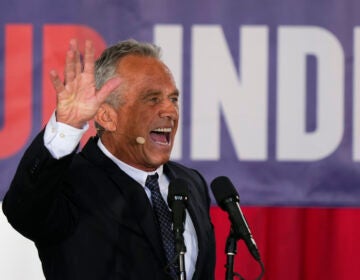Candidates of color say they need more party support, financial backing to be successful in Pa.
The party machines still reigned supreme in districts designed to give candidates of color the opportunity to win, results from Pennsylvania's May 2022 primary showed.

''It’s a much smoother path for candidates that don’t have those barriers in the way and those barriers are placed there too often to prevent BIPOC individuals to get into office,'' said Yamelisa Taveras, a recent candidate for the Pennsylvania State Senate seen here at her office in Allentown. (Matt Smith for Spotlight PA)
This story originally appeared on Spotlight PA.
Neither Omy Maldonado nor Yamelisa Taveras had run for office before May of this year.
Maldonado is a U.S. Marine veteran and Republican who works for a finance and technology management consulting firm. Taveras, a Democrat, works in social services, counseling people with substance use issues.
Compelled by different priorities, the Lehigh Valley residents decided to launch bids to represent a brand new state Senate district highlighted during the monumental redistricting process as an opportunity to increase Hispanic representation in the General Assembly.
Pennsylvania’s Latino population grew 43% between 2010 and 2020, and the five-member panel charged with drawing new legislative lines sought to reflect that increase by creating opportunity districts — areas with minority populations large enough to sway an election.
“Our new Senate District 14 already represents opportunities for influence,” Mark Nordenberg, chair of the Legislative Reapportionment Commission, said earlier this year.
Nearly 40% of the voting-age population in state Senate District 14 is nonwhite. But regardless of whether a Democrat or Republican wins in November, its next state senator will be a white person who previously held elected office.
“I am happy with the fact that we gave it all and with very few dollars and very few people, very little support, we were able to accomplish all of this,” said Taveras, whose two opponents raised tens of thousands more dollars than she did. “I was the only Latina that took the risk and ran.”
Following the May 2022 primary — the first election cycle under the new legislative maps — Spotlight PA analyzed races in five opportunity districts to examine the initial effect of such seats on the representation of marginalized communities.
At least one candidate of color ran in either the Democratic or Republican primary in each district. Only two of the six candidates won their primary, one of whom ran unopposed.
The candidates told Spotlight PA that the demographic composition of the district generally did not overcome a more deep-rooted disadvantage: running for office without resources or party support.
“It’s a much smoother path for candidates that don’t have those barriers in the way and those barriers are placed there too often to prevent BIPOC individuals to get into office,” Taveras said. “When we go into different races, we are going with passion and purpose — not with money and resources.”
An uphill battle
Five of the candidates ran in an opportunity district that lacked an incumbent and told Spotlight PA that an open field — rather than a large minority population — motivated their campaigns.
In Harrisburg, Democrats Eric Epstein and Justin Fleming ran against each other in state House District 105, which has a voter makeup that is 37.8% minorities, most of them Black.
Fleming, who is Black, has spent his career in and around public affairs. He is currently a Susquehanna Township commissioner and has worked in the press offices of several state departments.
He won his primary election with over 60% of the vote.
Fleming said the district’s lack of an incumbent encouraged his run, rather than its demographics.
“I was unfamiliar with the term [opportunity district]. It was a district that just made a lot of sense to me, having grown up in this community,” said Fleming. “Truthfully, it’s impossible to say. Had the existing district and the incumbent chosen to run again, would I be running? Probably not.”
Maldonado in the Lehigh Valley didn’t know his district was an opportunity district when he launched his campaign, only learning the term a few weeks into his candidacy.
The fact that state Senate District 14 was an open seat “heavily played into my decision in deciding to run,” Maldonado said.
Although he didn’t face an incumbent, Maldonado still felt disadvantaged by his lack of name recognition.
One of three Republican candidates, Maldonado won 20% of the vote. His opponents, Dean Browning and Cindy Miller, both held elected positions in Lehigh County.
“When you start to go and actually knock on doors, you start to actually tell people [about yourself], it’s very expensive to educate,” said Maldonado.

Many of the candidates who spoke with Spotlight PA described an uphill battle, as they had few resources and a lack of “traditional” political experience, making it difficult to navigate the party system and accrue endorsements or donations. Nonwhite candidates often face questions of “viability” that their white counterparts do not.
Born in the Dominican Republic, Taveras began to volunteer for political campaigns two years ago, helping organize for various Latina candidates.
She described “layers” of qualifications to be seen as a viable candidate— prerequisites such as interning for lawmakers or studying political science — that can be less accessible for immigrants or nonwhite and low-income people.
Taveras emphasized that first-time candidates are not necessarily inexperienced. Rather, their experiences differ from those of “traditional” politicians. Still, that lack of traditional experience makes potential endorsements and donations harder to come by.
Yesenia Rodriguez is the only Democrat who ran in state House District 116′s primary. The district was drawn with no incumbent and includes the majority-Latino city of Hazleton.
Rodriguez immigrated to the U.S. at 14 from the Dominican Republic and owns a bakery in Hazleton, where she’s lived since 2004. She became involved in local politics when she learned the Hazleton Area School District, where her children were enrolled, had a dearth of bilingual counselors. The issue prompted her unsuccessful run for a position on the school board in 2019.
“I think there’s always a challenge there when you are from the Latinx community,” Rodriguez said. “[Voters] see it as ‘this candidate is only going to represent the Latino community.’”
During her campaign, Rodriguez did not receive direct financial support from the Luzerne Democratic Party, but she said the party did provide volunteers to help make phone calls.
“You have to do your job, knocking on everybody’s door, making your phone calls, and doing your job as a candidate … but you also need money. You do need funding, so you can do your [TV] advertisement, radio advertisement, the newspaper,” said Rodriguez. “Funding is always an issue, and usually those that get the funding from the big companies, they’re able to be more successful.
“But it’s not everything. I plan on going during the summer and — if I have to — knocking on each and every door for my district.”

A need for campaign cash, connections
Running for statewide office often costs millions of dollars. Legislative elections cover smaller areas, but campaigns still spend tens or even hundreds of thousands of dollars to buy advertisements, pay staff, and fight lawsuits.
Only two of the six candidates Spotlight PA spoke with raised more than $10,000 between the beginning of 2021 and early May 2022, according to campaign finance reports.
Norberto Dominguez, a writer who also works in private security, was one of three Democrats to declare his candidacy in state House District 22 and the only Latino. The district includes Allentown, has no incumbent, and has a voter makeup that’s 53% Hispanic and 67% minority.
Legislative candidates had less than two weeks to circulate nominating petitions and collect signatures because of redistricting-related lawsuits, and Dominguez rushed to local grocery stores and barbershops so he could get on the ballot.
On the morning the petitions were due, he drove to Harrisburg feeling nervous, having collected just over the minimum 300 signatures required. He later withdrew his candidacy, explaining that he was unsure that the filing petition would hold up if challenged. He did not have the funds to counter a challenge in court.
“There’s a part of me that feels like if had I had the funds to pay for a good attorney that deals specifically with elections, that we may have gotten out of it with maybe just a few over 300,” said Dominguez.
Before his withdrawal, Dominguez’s campaign raised just over $1,000. The candidate who won the Democratic primary — Josh Siegel, an Allentown City Council member who is also chief of staff in the Office of the Lehigh County Controller — has raised over $42,000, including large donations from unions and local businesses.
Similarly, Taveras’ campaign reported raising just over $2,500, most of which was accrued through a single donor. Both of her opponents raised more than 20 times that amount, according to their campaign finance reports.
One opponent, Allentown school board member Nick Miller, loaned $20,000 to his campaign and received contributions from local politicians, unions, and PACs. Another candidate, Northampton County Commissioner Tara Zrinski, received $20,000 from a PAC that supports women candidates, among other large donations.
In Harrisburg, Fleming raised over $106,000 according to his campaign finance reports, a total he attributed in part to his existing political connections.
He received money from the PACs of George Scott, a former candidate for state Senate, and House Minority Leader Joanna McClinton (D., Philadelphia). Fleming also received a $10,000 in-kind contribution from the Pennsylvania House Democratic Campaign Committee, the “political arm” of the House Democratic caucus, for “staff costs.”
Fleming was the only candidate Spotlight PA spoke to who received financial support from his party’s official campaign body.
“Those were like connections and folks I’ve worked with in the commonwealth, the people I worked with in various government affairs capacities,” said Fleming. “That was pretty unique — for me to have that base or perceived base of support from which to draw as a first-time candidate at this level.”
While opportunity districts provide good starts, Dominguez believes that not enough is being done to guide candidates of color through the process, and that established political organizations and party establishments do not provide enough support to nonwhite candidates.
“People of color do not have access to that machine,” he said.
Maldonado in the Lehigh Valley said that he doesn’t think the party establishment should back candidates of color even in districts with large minority populations, as they might unfairly tip the scale in an election.
“Party establishment down in Harrisburg, whether you’re Democrat or Republican, wants to also be neutral, especially in the contested primaries,” he said. “They don’t want to go all-in on one candidate.”
Enid Santiago twice opposed Democratic state Rep. Peter Schweyer of Lehigh County, coming within 50 votes of defeating him during the 2020 primary. This year, she ran again against him in new House District 134, which has a 39% Hispanic voting-age population.
In both her campaigns, Santiago said she was unsupported by the Democratic establishment. She described being approached by a high-ranking member of the local party who tried to persuade her to run for a school board or city council seat, rather than a state House position, in 2020 — an incident confirmed by another source.
“It’s one thing when you don’t endorse a candidate and you don’t financially support them, and you don’t provide them resources,” she said. “It’s another thing when you are working with that candidate to make sure that there is no equity and that is what I dealt with.”
Santiago said she also did not have access to the Voter Activation Network, an insider tool Democratic candidates use to easily contact voters and mobilize volunteers.
The Pennsylvania House Democratic Campaign Committee determines who can use the database. Executive Director Trevor Southerland said the committee denies access to candidates running in a contested primary because it supports its members.
“It’s literally the good old boys club,” said Santiago. “Let’s keep the players where they’re at and make sure that we do not allow any outsiders to come inside the circle.”
 Spotlight PA is an independent, non-partisan newsroom powered by The Philadelphia Inquirer in partnership with PennLive/The Patriot-News, TribLIVE/Pittsburgh Tribune-Review, and WITF Public Media.
Spotlight PA is an independent, non-partisan newsroom powered by The Philadelphia Inquirer in partnership with PennLive/The Patriot-News, TribLIVE/Pittsburgh Tribune-Review, and WITF Public Media.
WHYY is your source for fact-based, in-depth journalism and information. As a nonprofit organization, we rely on financial support from readers like you. Please give today.






